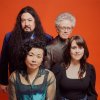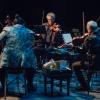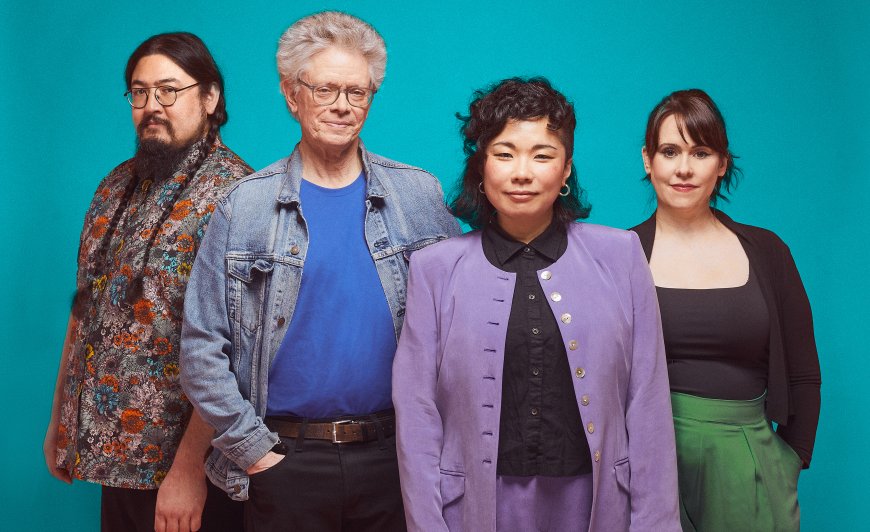
The 10th annual Kronos Festival, which takes place April 25–27 at SFJAZZ, will mark the Kronos Quartet’s first Bay Area performances after a recent round of musical chairs.
Second violinist Gabriela Díaz and violist Ayane Kozasa joined the pioneering contemporary-music ensemble last summer, stepping into roles long held by John Sherba and Hank Dutt, who jointly retired in June 2024 at the conclusion of the ensemble’s 50th-anniversary season. Only a year before, in 2023, had composer-cellist Paul Wiancko officially joined the group.
“It’s been a whirlwind,” said Díaz, who lives in Boston, where she is on the music faculty of Wellesley College, performs as a member of A Far Cry, and leads the Boston Modern Orchestra Project as its concertmaster.
Since getting two fresh middle voices last year, the Kronos Quartet has already performed around a dozen concerts (including a recent Carnegie Hall program that received a rave review from The New York Times) and recorded three albums.
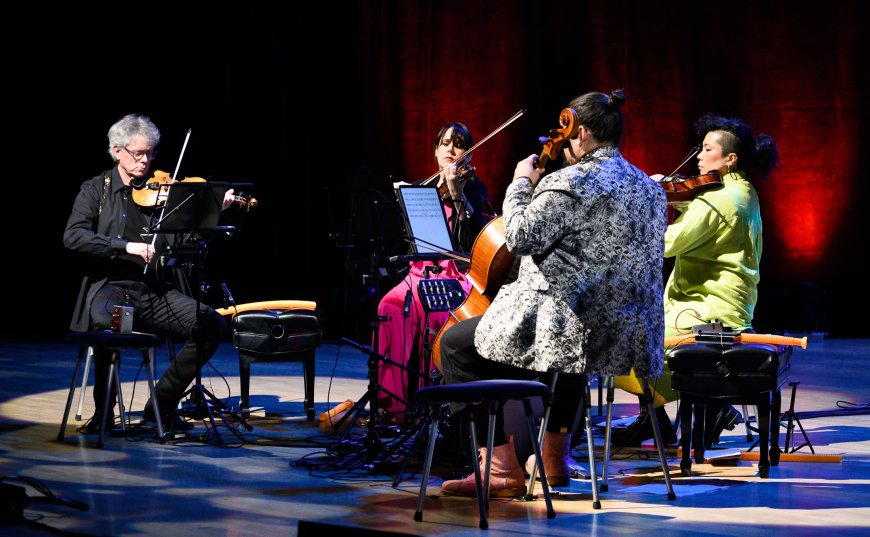
“Never in my wildest dreams would I have ever imagined that I would be in this position that I am right now,” said Díaz, who discovered Kronos’s seminal 1990 album Black Angels while a student at New England Conservatory in the early 2000s. She credits the Quartet’s discography for introducing her to new sounds and leading her down a “rabbit hole” of new music.
Kozasa’s first exposure to Kronos came even earlier. She recalled how, as a young violinist (she began playing at age 4 and switched to viola in college), she saw an episode of Sesame Street featuring the Quartet and was fascinated to observe the instrument she was learning showcased on TV alongside puppets she loved.
That formative memory stuck with her and would later inspire some of her work with the Aizuri Quartet — namely AizuriKids, a pandemic-born educational video series that sought to introduce children to some of that group’s favorite contemporary composers, including Conlon Nancarrow and Eleanor Alberga. Kozasa was a founding member of Aizuri and remained there until 2023.
Kozasa is currently based in Cincinnati, where she is finishing her final semester as an assistant professor at the University of Cincinnati College-Conservatory of Music. She and Wiancko — who are partners, play in a duo together, and are also members of another quartet collective, Owls — are planning to move to San Francisco.
Kozasa views her role as a performer as potentially far-reaching. “We’re a conduit for composers and artists’ voices,” she said. “We have an opportunity to try and change the world [through music, and] I think it’s really important not to let those opportunities slip away and make sure that every time we perform, we use our platform to say something that’s important.”
That’s an artistic ethos for which Kronos has long advocated. Just consider the group’s upcoming festival, titled “Good Medicine,” which will mark 50 years since the end of the Vietnam War and shine light on the urgent issue of climate change. The name comes from the final movement of Salome Dances for Peace by longtime Kronos collaborator Terry Riley, whose 90th birthday will also be celebrated over the festival’s three days.
“[It’s a] healing piece that leaves all of us with more energy than when we started playing,” said first violinist and Artistic Director David Harrington, who continues to perform with the group he founded in 1973. “It seems to me like it’s a good moment to have some good medicine.”
Harrington, who is now the sole remaining original member of the Quartet, told the San Francisco Chronicle last year he hadn’t considered retirement.
“I feel incredibly alive playing the music that has been written for Kronos, and I think composers are stepping up to the plate in very interesting and amazing ways right at the moment,” Harrington said in an interview this spring with SF Classical Voice. “I can’t imagine not having [Kronos] in the time that we are in right now, and I feel like I’ve spent the last 51 years getting ready for this kind of situation.”
In keeping with the Quartet’s long-running mission of promoting new music from a global perspective, this year’s festival features world premieres of works by Hildur Guðnadóttir, Soo Yeon Lyuh, Aleksandra Vrebalov, Laura Ortman, and Tsering Wangmo Satho.
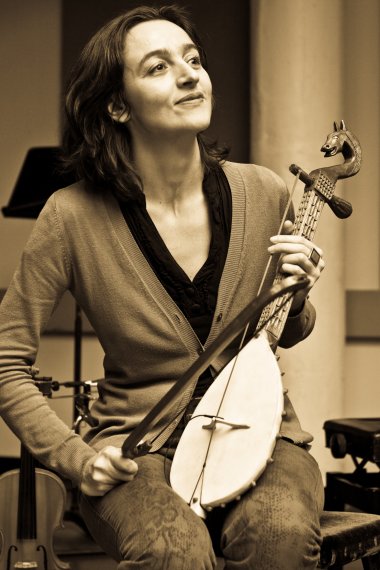
Vrebalov’s Cardinal Directions is a 15-minute piece commemorating the Vietnam War anniversary and will feature Vietnamese instrumentalist Vân-Ánh Võ. The music was directly inspired by painful archival images of the war and connects these with the composer’s own experience living through the collapse of her home country of Yugoslavia, including the 1999 NATO bombing. The work is divided into five short movements — four that correspond to the cardinal directions of north, south, east, and west, plus a final “Angel Lacrimosa” written from the perspective of a spirit observing a barren world devastated by war.
“My hope always for anyone who survives or witnesses the devastation of war is that we could potentially become wiser, better people with more empathy for one another, and the piece is grounded in that belief,” Vrebalov said.
She has had a long relationship with Kronos, having first met the ensemble about 30 years ago while a student at the San Francisco Conservatory of Music. She’s since composed 20 works for the Quartet and considers the group her “greatest mentors” — especially when she looks back on her days as a young composer.
“On many levels, both personal and professional, I just cannot imagine a more creatively fruitful collaboration and friendship,” she said.
Among other highlights of the festival will be a cross-disciplinary performance with visual artist Ariel Aberg-Riger, who has created a film on the trailblazing environmentalist Rachel Carson, and the West Coast premiere of Elja by Norwegian Hardanger fiddle master Benedicte Maurseth and composer Kristine Tjøgersen. That latter piece will see the Kronos players swap out their usual instruments for a set of ultra-resonant Hardanger fiddles.
There will also be two free “Kronos Labs,” including one on April 26 featuring Berkeley-reared composer Gabriella Smith, who will discuss Keep Going, a 2023 work she wrote for the Quartet that weaves music with voices of innovators across the world who are combating climate change.


